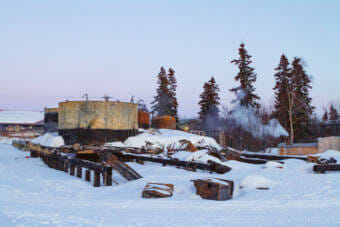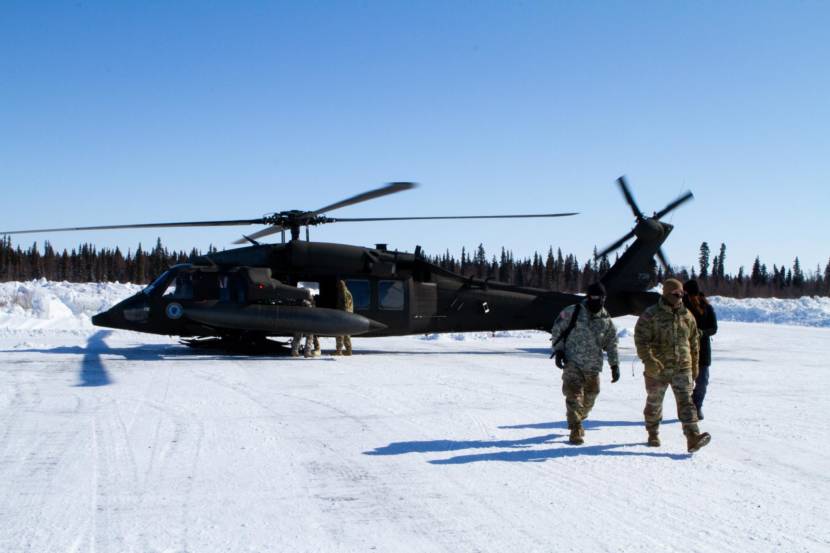
On April 8, members of the National Guard and other state officials visited the village of Tuluksak to meet with tribal leaders and community members. The visit came nearly three months after a fire destroyed Tuluksak’s water plant. During the meeting, council members shared their current needs and discussed potential spring flooding.
Snow swirled around the airstrip as a Black Hawk helicopter made its descent. The helicopter carried Maj. Gen. Torrence Saxe, the head of the Alaska National Guard. Also on board were other guard members, officials from the Alaska Department of Environmental Conservation and a representative of the governor’s office.
Tuluksak Tribal Council members met the group, piled them into trucks and took them to the Tuluksak school. They passed the charred remains of the town’s former water plant on the way.
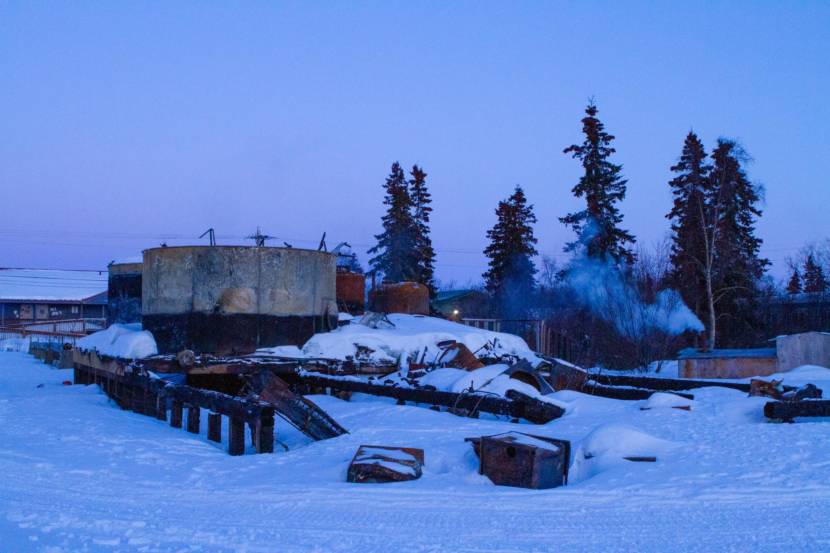
The guard convened a town hall to learn more about Tuluksak’s ongoing water insecurity and to discuss how to prepare for potential flooding during breakup.
This was the second time in nearly four months that state representatives visited Tuluksak. A National Guard tribal liaison and a specialist from the Department of Homeland Security and Emergency Management visited Tuluksak on Feb. 22, five weeks after the fire.
At the school, the principal gave a tour of the temporary water plant facilities.
“This is the water coming from the river, filled up into these two containers,” he explained, showing the system in the school’s shop.
During the tour, tribal council members told the visitors what the community still needed following the fire. That included more bottled water and possibly help to deliver a portable water plant from the Yukon-Kuskokwim Health Corporation in Bethel that would provide a larger volume of drinking water to the town. They also voiced concerns about breakup threatening food and water supplies.
Saxe listed concerns of theirs to follow up on.
“If it were to go bad here, what that means for water, COVID mitigation, potential evacuation, we’ve gotta, of course, get you water. But we’ve gotta get you to safety first,” Saxe said.
Then, the group moved to the empty gym for an awards ceremony where tribal council member Kristy Napoka and tribal administrator Elsie Allain received the Alaska Community Service Award from the National Guard.
The two awardees coordinated obtaining and distributing privately donated bottled water and helped get emergency water filtration systems installed. Both women said that the meeting went well.
“Better than I expected,” Napoka said. “It seemed to me that they were hinting us that they are going to assist us.”
Napoka said that in the initial months following the fire, Tuluksak wasn’t getting tangible assistance — like bottled water — from the state.
Allain said that it wasn’t necessarily a good sign when the state called.
“It was becoming like a pattern that I noticed,” Allain said.
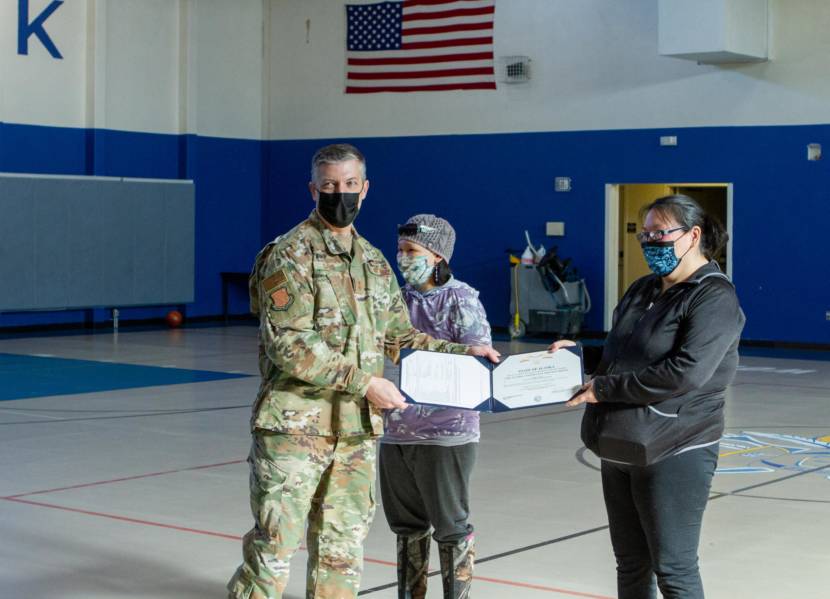
Allain said that the community needed drinking water from the state after the fire. But instead of sending water, the state would call the tribe to ask if water had been donated from somewhere else.
“That’s when it occurred to me that State of Alaska is monitoring the situation but not planning to step in,” Allain said.
Often, bottled water donations were sitting in a warehouse in another city. The state also checked that the store had water to sell, which it did for around $60 a case. The state has said that Tuluksak residents always had enough water. The state has also said instead of providing immediate aid after crises, it prefers to focus on long-term rebuilding and recovery. The state did declare a disaster three and a half weeks after the fire. Two weeks after that, it paid for the delivery of privately donated water.
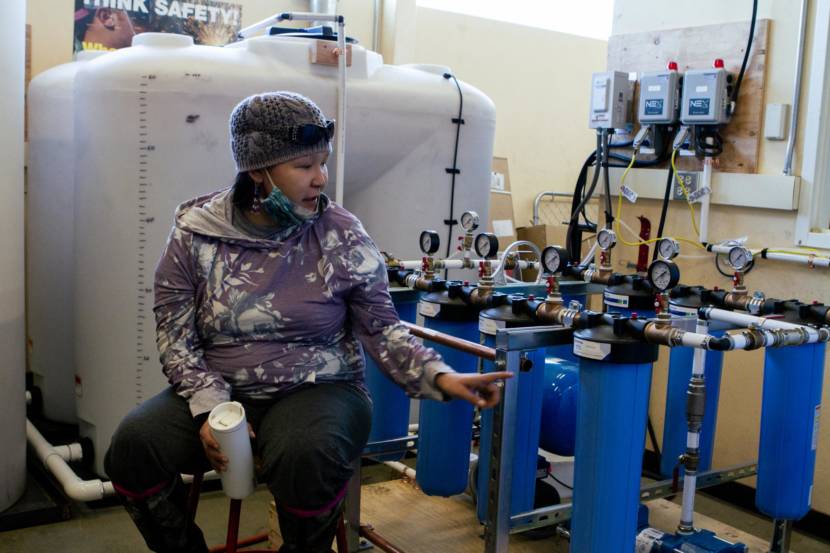
Allain and Napoka asked Saxe about these phone calls. He said that he would have the director of emergency management call them back.
Towards the end of the meeting, which covered a lot of difficult topics, Napoka cracked a joke. She said that it was good to share a laugh, and Saxe agreed. Saxe said that now that they’ve met in person, he hopes that they can establish a relationship.
“It’s easier when I know people and I can hear direct from them,” Saxe said.
Saxe also outlined some next steps the departments he oversees could take to better equip the region for future disasters. He will consider adding an emergency manager in Bethel, whose office would be housed at the armory and could more easily and quickly respond to regional emergencies with regional partners, like the Yukon-Kuskokwim Health Corporation or the Association of Village Council Presidents. During his visit, Napoka and Allain also both volunteered to be village emergency coordinators. There are also hopes to hold a training for village volunteer emergency coordinators this summer.
Editor’s note: KYUK’s Olivia Ebertz was also on board the National Guard helicopter that transported members of the guard and state representatives to Tuluksak.

